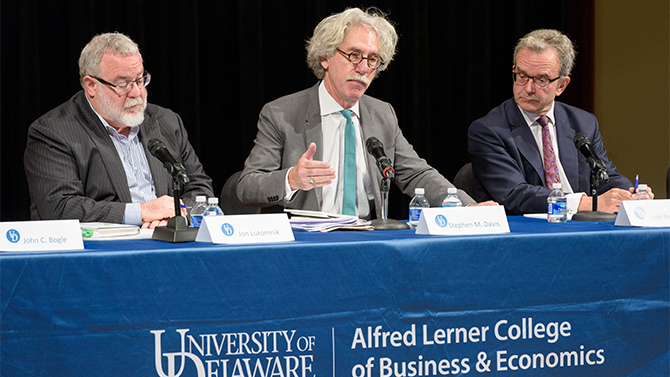


Fixing the financial system
Photo by Evan Krape November 10, 2016
Conference explores ways to improve financial industry
The University of Delaware’s John L. Weinberg Center for Corporate Governance hosted a program titled “How the Financial System Fails Investors and How to Fix It from a Structural and Governance Perspective” on Nov. 1 in the Gore Recital Hall of the Roselle Center for the Arts.
Stephen Davis, Jon Lukomnik and David Pitt-Watson, co-authors of What They Do With Your Money: How the Financial System Fails Us and How to Fix It, were three of the five participants. This marked the only time all three authors were together in the United States for a presentation.
The discussion’s other two participants were John Bogle, legendary founder of Vanguard, and Jennifer Taub, a law professor at Vermont Law School.
Charles M. Elson, UD’s Edgar S. Woolard, Jr. Chair in Corporate Governance, professor of finance, director of the Weinberg Center and moderator of the event, let each participant share their preliminary thoughts before taking questions.
The first to speak was Pitt-Watson, former head of the Hermes shareholder activist funds in Europe and executive fellow of finance at the London Business School. He provided an overview of the important themes in his co-authored book.
He indicated that financial institutions are critical to a capitalist society. Pitt-Watson said that the important question is whether the financial industry does its job well and is it fit for purpose. He then discussed the importance of financial intermediaries in the market.
Davis, associate director and senior fellow at Harvard Law School Program on Corporate Governance, was the next panelist to speak. He pointed out that there are 16 different financial intermediaries between individual investors and users of their capital, and that each intermediary extracts fees along the way. Davis focused on the importance of transparency with regard to fees so individual investors understand what they are paying.
Lukomnik, executive director of the IRRC Institute and managing partner at Sinclair Capital LLC, the final co-author of the book, added to Pitt-Watson’s and Davis’ points.
He discussed the manner in which the asset management industry compensation incentives work against individual investors. He also focused on the overemphasis on trading.
He stressed fiduciary rules and the importance of deemphasizing trading, and suggested ways in which Wall Street could improve, become more efficient and benefit individual investors.
“Eight percent of GDP flows through Wall Street,” Lukomnik said. “If we could make it a little more efficient, we could grow the real economy faster.”
“We are doing to Wall Street what Wall Street does to every other business: They put out an analyst report on a company and say, ‘If you do this, you could make more money.’ Now we’re saying that with regard to Wall Street.”
Bogle began his remarks by reading a section from his Princeton college thesis on the topic of mutual funds. He noted that in 1951 institutional investors owned about 3 percent of the equity market, but today they own about 70 percent.
Citing his “college boy enthusiasm,” Bogle went on to suggest that changes be made to the financial system and how institutional investors operate. He noted that financial intermediaries should have the interests of individual investors in mind.
Bogle said that the industry is fatally flawed – in most cases looking to take its share of returns before giving them to the investors – which creates plenty of room for improvement. He noted that mutual funds’ governance needs to be examined.
Bogle added that it all comes down to how stock market returns are divided between Wall Street and Main Street, and whether or not Main Street is getting its fair share. Bogle concluded that in most cases, it is not.
Taub, the final panelist, discussed how money managers take into account the interests of the financial institutions rather than the interests of individual investors. She reviewed some examples, as well as some examples of improvements that have been made.
Taub said that the SEC has been requiring better disclosure of fees, for example, but more progress is needed.
In concluding remarks Davis said that institutional investors need to be stewards, citing examples of topics about which institutional investor stewardship is being unlocked (like say-on-pay, mutual fund voting disclosures and majority voting).
Pitt-Watson noted that we have to keep asking about the purpose of our financial system, and if it is fulfilling that purpose.
Lukomnik noted that financial agents at all stages of the process should have fiduciary duties. He said that there should be transparency on how the agents are paid, by whom and how much.
Contact Us
Have a UDaily story idea?
Contact us at ocm@udel.edu
Members of the press
Contact us at 302-831-NEWS or visit the Media Relations website

